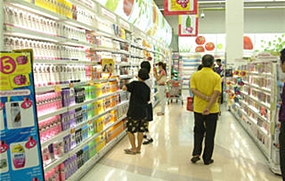BANGKOK, Feb 1 — Thailand’s Consumer Price Index (CPI) in January rose 3.38 per cent year-on-year to 113.21, growing in at a slow pace during the period of the country’s post-flood rehabilitation, according to the Commerce Ministry.
Prices of food and beverages rose 7.7 per cent, with rice, starches, and flour products rising 2.34 per cent, meats, poultry, fish and seafood by 10.52 per cent, while eggs and dairy products were up 2.30 per cent. In addition, fuel and energy rose by 6.48 per cent.

Inflation in January climbed 0.39 per cent, compared to December, said Permanent Secretary for Commerce Yanyong Puangrach.
Meanwhile, the core CPI, excluding food and energy prices, in January increased by 2.75 per cent year-on-year and 0.26 per cent compared to December last year, Mr Yanyong said.
The commerce ministry targeted the 2012 inflation rate on average to grow within the range of 3.3-3.8 per cent based on assumptions that Dubai crude oil price stays around US$95-115 per barrel, the baht remains at 29-33 baht against the US dollar, as well as the government continuing its measures to cut the cost of living.
The major factors which will further impact Thai inflation were the volatile global economy, domestic and foreign political situations, particularly in Europe and the Middle East, which will affect oil prices as well as natural disasters, currency exchange and interest rates.
Regarding increase of start-up salaries of civil servants and university graduates to Bt 15,000, the government will spend additional Bt7 billion and it will have an impact on inflation of around 0.01-0.02 per cent.
To implement the policy to raise the daily minimum wage to Bt300, the permanent secretary said it is likely to affect inflation by about 0.1 per cent.




